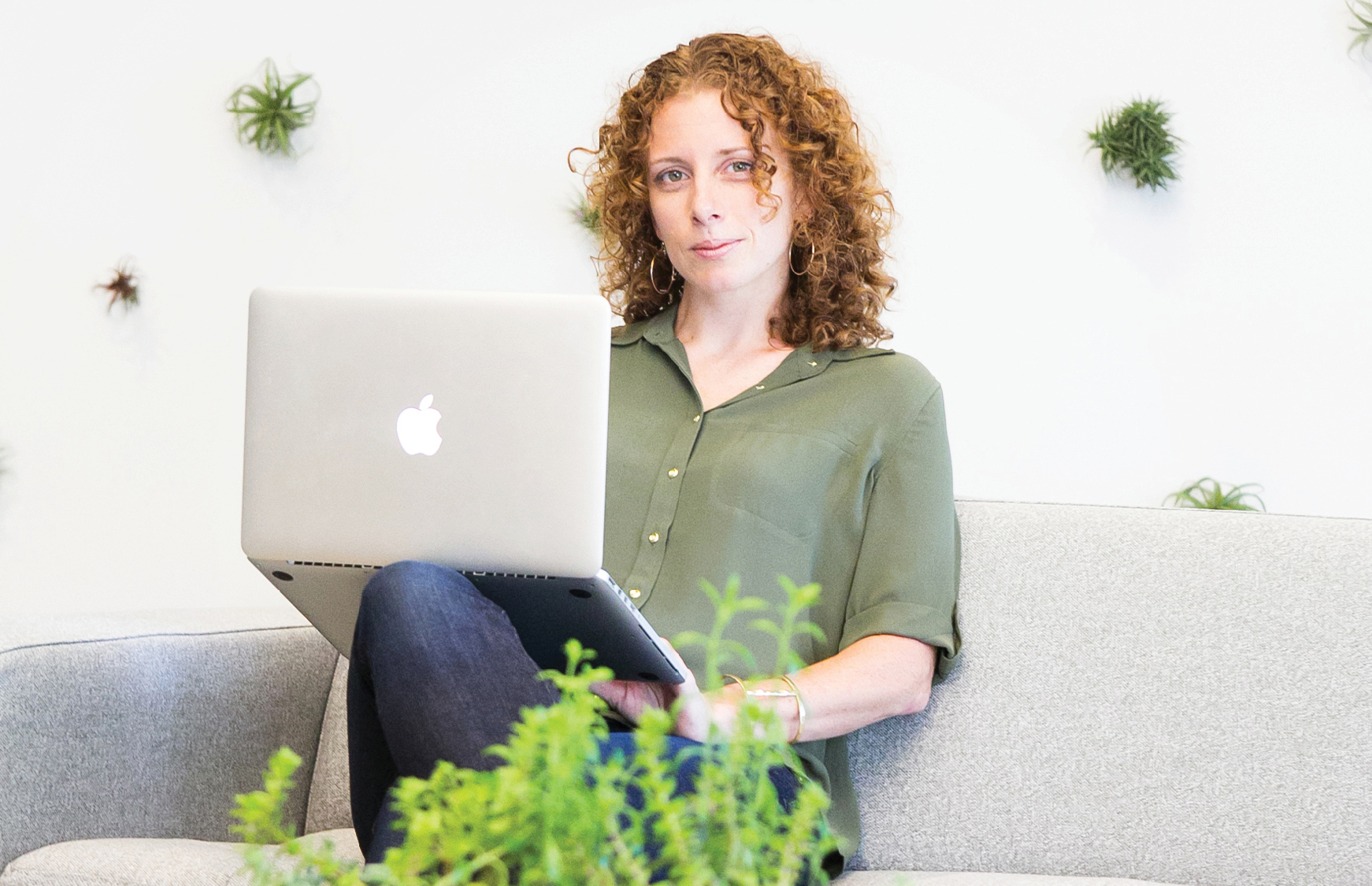The beginning of this hardworking Contessa’s story is a testament to her work ethic: Jamie Hull paid her way through college and grad school by working 40 hours a week in retail, as a bartender and in various tech-related internships—all on top of a full course load! While, for most people, the idea of a post-grad job is an overwhelming dive, for Jamie it was a break.
Jamie’s strategy for finding a job that was the right fit for her was as analytical and logical as the job itself. She compiled a list of companies that she thought coincided with her hobbies, interests and skills, but that were still small and needed developing. Evernote ended up on the list, and the results of her formula proved to be accurate and precise.
Jamie worked her way through the company, beginning as product manager and eventually becoming Vice President of Web and Commerce Products. In this role, Jamie is in charge of a wide variety of tasks, and ultimately oversees and manages a large group of employees. Her strategy for keeping sane in such a high-profile position? Staying positive, honest and human—Jamie works a weekly shift at the office coffee bar!
Her Starting Point
Many people find the transition between college and “real life” a bit daunting. Can you tell us about your journey between the two? What was your first job post-college?
In some ways, my transition between college and "the real world" was pretty straightforward. I worked 30 to 40 hours a week throughout my undergraduate career—first in retail and then in various technology-related internships. The move from a full course load along with work to only work was a bit of a relief!
I also was extremely fortunate to be able to transition from my final internship into a full-time job at the same company, starting as a Web Developer for Zurich North America. I graduated just a few months after the tech bubble burst and a lot of new developers in my cohort were forced to find work in different fields or in roles they weren't particularly excited about. I got to stay somewhere where I was comfortable and continued to grow my tech skills. Life got crazy again when I decided to go back to grad-school while working full-time (and then picked up a second job bartending to pay for it!), but that was a couple of years later.
How did your degree in Computer Information Systems prepare you for the career you have now? What did you learn from it?
I think that the most obvious benefit of a CIS degree for someone working in product is an understanding of the basics of software development. Much of what a development team does will seem mysterious to outsiders, when in reality almost everything is very logical. Successful product managers don't need to be able to (and really shouldn't be trying to) write code, but a good grasp of computer science basics allows you to better understand the challenges your teams face, leading to better decisions overall.
But more importantly, my degree in CIS enforced a pretty rigorous discipline for logically working through problems. Code isn't written sequentially. You don't sit down, look at a spec and write a line for each requirement someone documented. Instead, you have to look at the overall picture and figure out, “What am I actually trying to solve? What are main components? How can I logically organize the code to be maintainable?” A lot of planning happens before any code is written, and that same process is invaluable when designing and specifying large projects for a team.
The realm of product management is very dynamic. What about this career path sparked your interest? When did you feel like this was the right direction for you?
I landed in product management almost by accident. I was working as a web developer for a small Baltimore start-up called Advertising.com building internal ad campaign management tools. We were growing quickly and adding new features constantly, but there was no PM assigned to our internal systems. As a result, almost every project that I worked on ended up needing multiple rewrites. No one was in charge of defining features, so I took direction from whoever happened to make the first request. Later, a different business unit would find out about the project and queue up a separate set of requirements.
As you might imagine, this was incredibly frustrating. I really loved solving people's problems and building things, but there wasn't much fun in building the same form three times in a month. So, I took my complaints to HR. I didn't want to leave the company, but was confident that "someone should be in charge of figuring stuff out" before a developer did work. Our HR team listened to my concerns and asked if I might be interested in being that person. I had an internal interview with our Director of Product and started as an Associate Product Manager a week later.
I immediately loved the change of pace. Talking to different groups, gathering information and making decisions—all before someone started implementation—was great. While my perspective on what makes a great product manager has evolved over the years, I remember that even the early days were fulfilling.
What do you love most about working at Evernote? What is the company culture like?
Hands down, the best part about working at Evernote is the people. The company is full of smart, motivated folks who love and use the product. We also have a company culture that values good ideas. People are encouraged to make suggestions and to question decisions, across the board, anywhere in the organization. That means that I have over 300 potential sources for suggestions, bug reports or beta testers. Pair smart people with the ability to give feedback and good things happen.
That's not to say everything is easy! Start-up life is crazy. Priorities shift, processes change and there is always too much to do, but it is helpful knowing that I'm always backed up by talented coworkers.
Her Big Break
Your career at Evernote started in Product Management before transitioning to Vice President of web and commerce products. What is the biggest difference between the two roles? How have you managed to switch gears?
At a company the size of Evernote, moving from product management into a VP role is less about switching jobs and more about what gets added on. I’m still responsible for the product management side of my teams, such as setting priorities, defining features and shipping product. I’ve just taken over the engineering management and recruiting parts as well.
And because finding and keeping top talent is hard work, my focus has shifted and the first priority is now recruiting and career development for my employees. I’ve definitely had to delegate more of the tactical side to others in order to take on my new responsibilities.
Could you let us in on any stumbles you might have made in your high-profile position? How did you get through them?
The biggest stumble I've made at Evernote was probably on the way to this position, not while occupying it. I remember having a discussion with my manager in which he asked me if I liked my current role and what I saw myself doing in the future. I spend a lot of time thinking about optimal corporate structures (yes, really!), so I spent most of the meeting expounding on the theoretical roles that could exist in some "mythical future Evernote" without committing to any of them as what I actually wanted to do. Not surprisingly, a promotion did not magically pop up after this meeting.
A few weeks later when I was replaying the conversation in my head, I realized that I'd made a mistake. I had fallen into the trap that so many women do and shied away from clearly stating my goals and asking for what I wanted. And I was mad at myself for doing it without realizing. I've read article after article stating that women ask for promotions and raises something like 10x less than men do, and I'd just done the same thing. So I scheduled another meeting, reopened the conversation and talked through specifics; what parts of my job I want to do more of and what parts I would be okay with if someone else owned. Then we came up with a plan for what role might work for me at Evernote. The change wasn't immediate, but we had a clear understanding and something to work towards.
If we had the chance to peek at your schedule, what would an average day look like?
I start most days with an hour at the gym, followed by my morning macchiato while catching up on email. After that though, I don’t know that I have an “average” day. If you were to judge based solely on the overview of my calendar, you'd probably assume that I live in meetings. And, to some degree, I do. Between project check-ins, design reviews, meetings with non-product teams and interviews, I’m typically in a conference room 5 to 6 hours, daily. However, the set of people I’m working with is different every day, and the problems we’re solving change constantly, so life is always interesting—even if it might look repetitive when viewed from the outside.
A lot of the real “work” in my day happens between meetings. Product managers need to keep a pulse on what’s happening on all of their projects. Those 5-minute informal check-ins with team members in the hallway are where I often make my most important decisions.
There are so many different aspects to product management (marketing, engineering, partner integrations). How are you able to focus on all of these areas equally?
The thing about focus is that you have to pick something to be good at; you can't "focus" on everything. Effective leaders need to know where they add the most value and where to let their teams shine. For example, I like to think I have a decent eye for good UX, but I'm not a designer. Anything more than rough wireframes takes me ages to produce, and will be lower quality than what my design team can do in a quarter of the time. This doesn't mean that I remove myself from the design process. I work with the team to set up the problem, answer questions and then get out of the way for a while.
The same is true for most of my interactions with other groups at Evernote. I don't need to be a great marketer or engineer in order to work with those teams, I just need to be effective in communicating with them and good at prioritizing requests from them. I think part of working in product is getting really good at targeted, "just in time" information delivery. Very few people need to know the nitty gritty details of every project you work on—they just need to know enough about what is coming up to plan ahead.
Her Perspective
How do you handle work/life balance?
I put a lot of myself into every product and feature that we build. I think you have to do that in order to produce something great. It shows if you don’t. So, when I think about work/life balance, I think about making sure that I take the appropriate steps to keep from burning out. My job (and, honestly, most jobs in tech these days) can't be done in a 9 to 5 environment. In a global company, you have team members coming online at different times, product launches hitting markets as those time zones wake up and customer requests coming in constantly. You have to be reactive when appropriate, but a surefire way of burning out is trying to address everything immediately. The trick is in triaging what needs immediate attention and what can wait.
Beyond that, my hobbies keep me sane. When I'm stressed, the endorphin rush I can get from just a quick hour-long bike ride completely changes my perspective, making intractable problems seem solvable. Listening to music keeps me focused at work, but performing with the local concert band helps me unwind in the evenings. Its good to have something other than your job that you love in order to keep perspective on what's important.
Translating passion into a career is tough. What advice would you give to women trying to figure this out?
I'm not sure that anyone knows what their "dream job" is until some time after they land it. I've found that your best bet is to treat the job search like a logic problem. Spend time thinking about things that you love—hobbies, apps, consumer products—look for themes and then try to overlay those with your skills. Are you fitness obsessed and a talented designer? Make a list of companies where those things might overlap. Or, even better, think about companies where they should overlap but don't yet seem to. Then get out there and see if they are hiring. If they aren’t hiring, see if you can convince them to hire you anyway. I landed at Evernote as a result of a very targeted search; I knew that I wanted to work on a consumer product I loved, but one that I thought still needed some work. So I went through my phone and made a list. Be selective, take your time and if it doesn't work out, don't be afraid to move on.
As a VP what are some of your strategies for leading a team effectively?
Figure out what motivates each of your team members, and keep that in mind every day. Everyone wants different things out of work, so understanding what drives each person will help you keep them on track and find projects to inspire and challenge them.
Keep your energy levels high. Even when you're tired, stressed and buried in email, your teams are going to take their cues from you. Bringing a positive attitude doesn't instantly solve every problem, but it can make a big difference in your team's productivity and outlook.
Lastly, be honest with your team. The most effective teams are made up of people who trust each other, and that includes them trusting you. There will be times when you have to ask people to work on projects that none of you are happy about. Its better to be upfront about why the project is happening, let them vent if necessary and then get everyone moving forward. No one appreciates a manager who just tries to parrot a false "company line"; they'll work more effectively with you if they know you're human, too.
And finally, what do you wake up looking forward to? What’s next for your career?
Most literally, I wake up excited to use the fancy coffee machine at work! Our executive team took barista training last fall to get certified to work the espresso machine at the coffee bar. Everyone who is trained also has to work a weekly shift at the coffee bar. My morning coffee ritual and my weekly lunch shift are some of my favorite parts of the week.
Personal coffee obsession aside, it speaks to Evernote’s culture that your morning could start off with the CEO serving you a cappuccino. I love bringing new people into the Evernote culture and I really look forward to focusing on that. The company is in such an exciting phase, with a ton of cool projects lined up, a lot of young talent to develop and even more great folks still to be hired. I think the next phase of my career is going to be about making the people around me successful.
You May Also Like
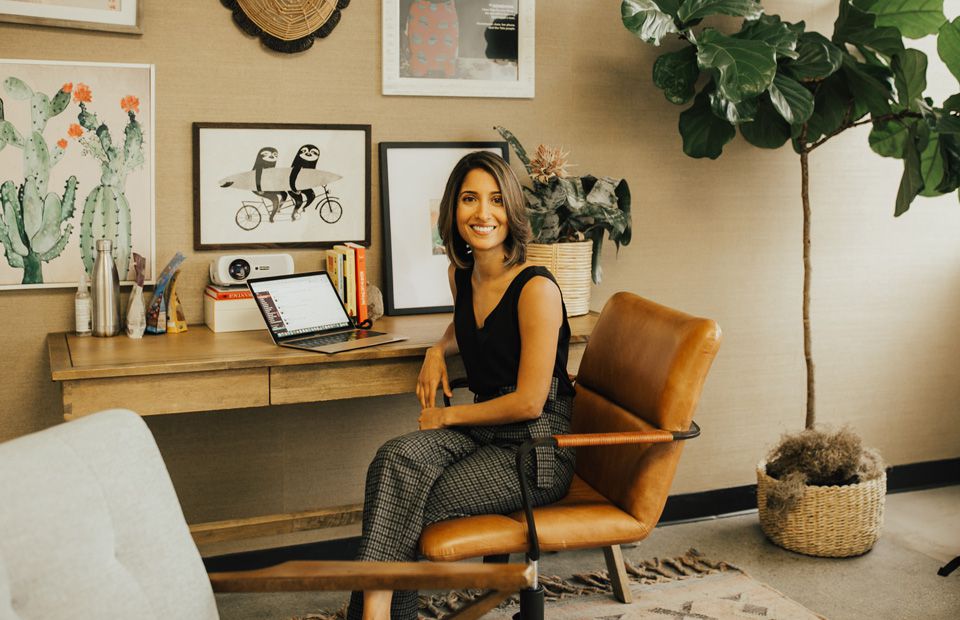
Technology
A Tech Founder on Why Being an Outsider Is a Strength
"I actually think most successful founders are rebels, of a sort. We’re trying to do new things and take on entrenched systems or ways of thinking. What makes me and our company different is that we’re outsiders."

Technology
Omoju Miller—Tech Veteran, Leader, and Volunteer Advisor to the Obama Administration—on The Crucial Role of Creativity in the Tech Industry
"If you are in an environment where you feel marginalized, leave. Don’t try to change it. Go and look for a place that sees you and lets you be you."
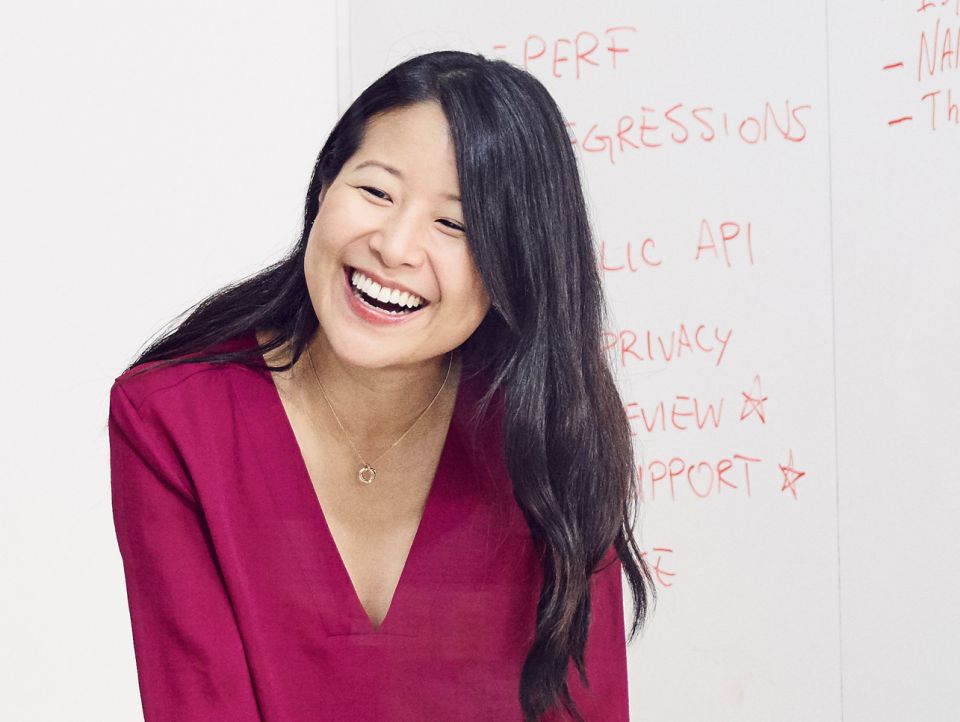
Technology
Sharing Stories as a Software Engineer
We sat down with Apple software engineer Emilie to learn about her day-to-day working at Apple along with what it takes to run the perfect meeting and her favorite ways to unwind.

Technology
Creating Impact with Apple
We sat down with Apple's Senior Developer Partner Relations Advisor, Cris, to learn about what it takes to create a lasting impact within a large company. She shares a typical day in the life, her favorite book recommendations, and her top four tips to running a meeting.
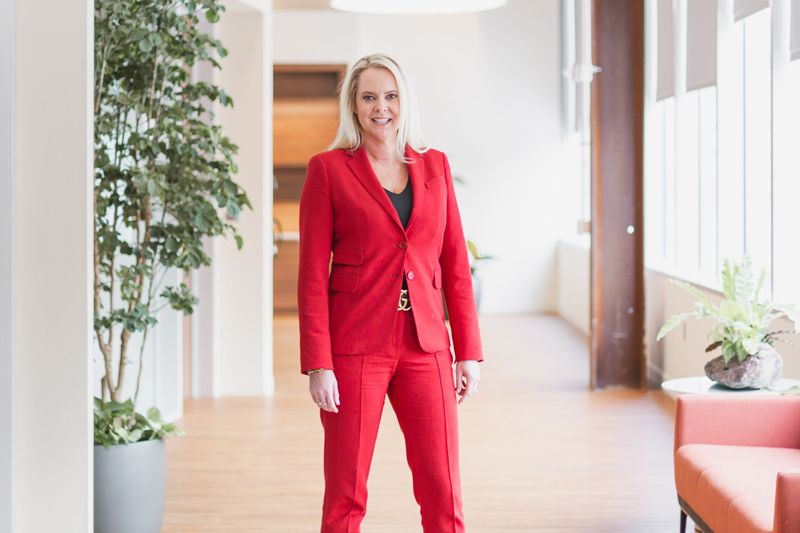
Technology
Salesforce’s Senior Vice President of Sales on Unconscious Bias, Failure, and Innovative Leadership
"Do not be afraid to fail, just bring your best self to the table."
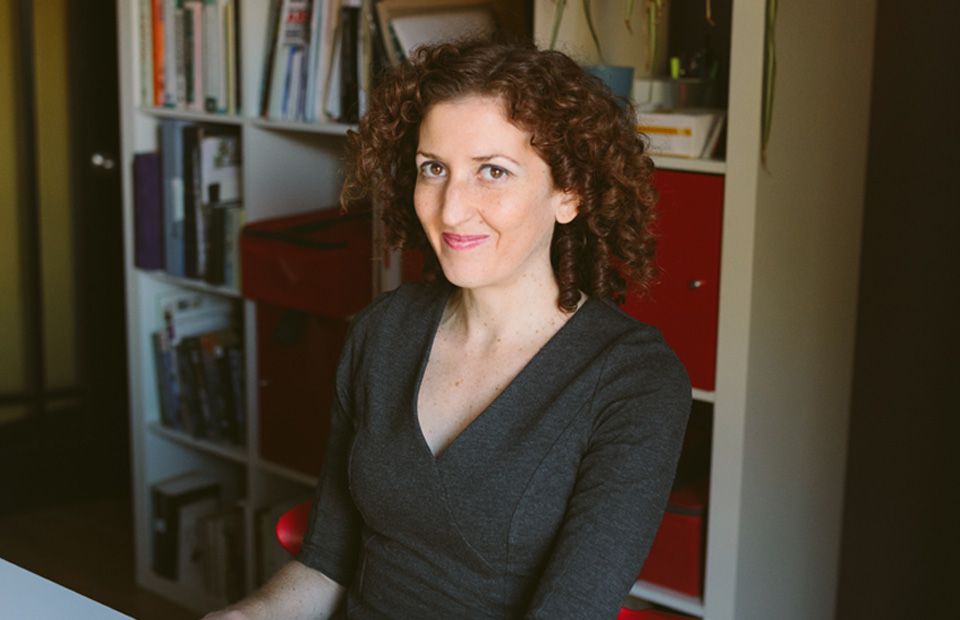
Technology
A Director of Engineering on Tech + Leadership
"I don’t believe in 'having it all'. If you spend more time on one thing, then you spend less time on another thing. All we can do is make choices on how to spend our time."
Get the Best Career Advice Delivered To Your Inbox
Join our newsletter to stay in the loop.
